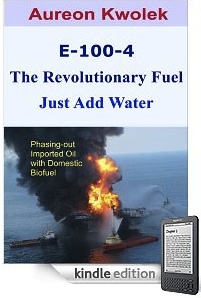Calling all gear-heads. I’ve come across an “e-book” that is just up your alley. It’s called “E-100-4: The New Revolutionary Fuel,” and is a technical overview of how to capitalize on ethanol’s high performance properties in engines. Actually, this overview is good for anyone who understands that ethanol’s fuel loss at higher blends is an engine problem, not a fuel problem.
 Most ethanol advocates understand that today’s engines are not manufactured to optimize ethanol; they are manufactured to optimize gasoline or diesel. Yet for nearly 100 years, there have been major technological breakthroughs using ethanol blends that have been “hidden” from consumers and never brought to market. In this technical overview, author Aureon Kwolek highlights all of these advancements, explains how they work and gives us the low-down on what companies are working on what technologies and their plans, if any to bring them to market.
Most ethanol advocates understand that today’s engines are not manufactured to optimize ethanol; they are manufactured to optimize gasoline or diesel. Yet for nearly 100 years, there have been major technological breakthroughs using ethanol blends that have been “hidden” from consumers and never brought to market. In this technical overview, author Aureon Kwolek highlights all of these advancements, explains how they work and gives us the low-down on what companies are working on what technologies and their plans, if any to bring them to market.
But what may have been most interesting about the e-book, is that Kwolek presents a very compelling case on why E-100-4 should be the fuel of the future – not E85. The major difference between E-100-4 is that is contains water and is known as hydrous ethanol. In Brazil, all of their flex-fuel vehicles run on hydrous ethanol (which is less expensive to produce and offers better fuel efficiency that anhydrous ethanol according to Kwolek). In America, we remove all the water before it is sold and blended with gasoline adding an extra step and extra expense.
Kwolek writes, “ We can also optimize that engine for hydrous ethanol. Our next assignment is converting water vapor into steam, and then into hydrogen, inside the combustion chamber. Adding the water component adds a quantum leap to fuel efficiency.”
So if the technology is there to fuel vehicles with E-100-4 hydrous ethanol, and for them to get better gas mileage than all other fuels and fuel blends, why isn’t it coming to market? Kwolek surmises the problem lies with the relationship between the petroleum industry and the auto industry. He says it’s “Because automakers have a lucrative alliance with petroleum and a conflict of interest with fuel efficiency.”
This is a great overview of ethanol engine technology and one that I highly recommend. Kwolek cites all of his resources and gives links so that readers can get more information on all of the technologies that he features in the summary. You can purchase a copy of the e-book, E-100-4: The New Revolutionary Fuel,” here.

